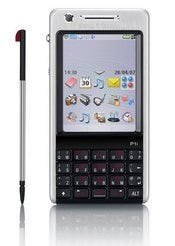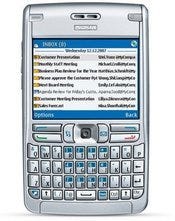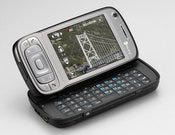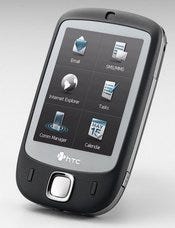Rip Up That Contract: How To Buy An Unlocked Phone
You don't have to be tied to a mediocre phone until death do you part. There are better 'free-range' phones out there, unlocked and ready to run the features you want. But free-range doesn't mean free.

What's an "unlocked" mobile phone? Before the Apple iPhone, it's safe to say that relatively few mobile phone users knew or cared.
An unlocked phone is one that isn't limited to a particular provider's network and has all its features available, just the way it came from its manufacturer. Providers programmatically reconfigure the phone's features. Some of these changes are benign and necessary, like setting defaults for the phone's Web browser. Others are business-driven decisions: phone features like push-to-talk or wireless LAN support are locked out so providers can charge separately for them, or keep customers from using them in favor of other higher-profit options such as high-speed data plans.
| |
| |
When mobile phones were new and novel, locked phones made some sense. The providers had to give away a phone to sign up a new customer, and it seemed that no two providers' network technologies worked alike. But since that Neolithic age, a couple of things have changed: Mobile phone technology has become standardized, and phone makers have responded to a global demand for handsets with a blizzard of devices that offer far more than plain old wireless telephone service.
These days, however, there are some good reasons for owning and using an unlocked phone. You can get features you might not be able to get from your mobile service provider. You can gain coverage, moving your phone from provider to provider, even continent to continent. And you can obtain some independence from mobile service providers -- an industry that, at least in the United States, generally seems dedicated to the idea that the customer is always wrong.
In the early 1990s, most of Europe and Asia adopted the GSM technology. Only in the United States are the major national service providers still fighting the old battles: AT&T/Cingular and T-Mobile operate GSM networks, and Verizon and Sprint operate something else. GSM is an all-digital network, which means that handsets are little computers that automatically support a variety of digital services in addition to digitized voice, including high-speed data transfers for applications like Web browsing and text messaging. GSM operates in the 900- and 1,800-MHz radio-frequency bands in Europe, and the 850- and 1,900-MHz bands in the United States.
All GSM phones depend on a small plastic card with an embedded microchip, called a Subscriber Identity Module (SIM) to hold the user account information that identifies the phone to the provider's network. The SIM card makes a phone's personality portable -- swap a SIM and you can put your phone on a different network or, conversely, put a different phone on your network.
This standardization of the mobile network environment around the world (except the United States) has resulted in something like a free market for handset manufacturers. They can sell phones with a seemingly endless variety of features to users, and users can buy phones with exactly the features they want.
Why An Unlocked Phone?
There are several reasons why you might want an unlocked phone:
First, if you've already got a contract with a GSM network provider, buying an unlocked phone can be an easy way to replace an aging phone with a newer, sexier one before your contract would allow you do so.
Then, handsets are rapidly becoming technology mashups. You can combine voice telephony with just about any other kind of handheld device if you can find the right phone. AT&T has been slow to sell Wi-Fi-capable phones, for instance, but you can get an unlocked phone with Wi-Fi. You want a 5-megapixel camera phone? Try the Nokia N95. Would you like GPS on your phone. There are plenty of GPS phones out there.
If you want a decent deal on mobile service but don't fancy indentured servitude to a provider, you can maintain more independence by owning your own handset.
Finally, going global is far easier with an unlocked phone. GSM phones work around the world, but U.S. carriers charge high global roaming fees. In most countries you can save money -- and get a local phone number -- by buying a prepaid SIM card from a local carrier and using it in an unlocked handset.
Issues To Deal With
Buying an unlocked phone presents some issues, but nothing you can't handle unless you're a hopeless tech-weenie.
A major problem can be frequency compatibility. GSM networks operate on four frequency bands, 850 and 1,900 MHz in the United States and 900 and 1,800 MHz in most of the rest of the world. Unlocked GSM phones may support two, three, or all four of these bands. A quad-band device will give you the widest coverage both in the United States and overseas.
Imported unlocked tri-band phones typically support 900, 1,800, and 1,900 Mhz (great if you're going to Europe on vacation, maybe not so good for some outback areas of the States). U.S. carriers have their widest coverage in the 1,900-Mhz band, but there are areas of the country where having a phone that works in the 850-Mhz band might be the difference between getting a signal and not. It's a good idea to check with your preferred carrier about coverage before you buy a phone.
You can buy dual-band handsets -- 850 and 1,900 MHz -- but those, obviously, were probably manufactured for U.S. service providers and intended only for use in the United States. If you want an unlocked phone to take overseas, make sure the one you buy supports at least the overseas 900 and 1,800 Mhz bands.
Network compatibility also needs to be considered. An unlocked phone may need some tweaking to configure it for your provider's network. Internet browser settings, in particular, seem to be a problem for phones using WAP browsers because each carrier is in effect proxying its customers to the Web.
Unlocked phones tend to be, umm . . . a lower priority . . . for service providers' customer support, so your best help may come from searching online forums like WirelessAdvisor.com to find settings help if you need it. If you have an unlocked Sony Ericsson or Nokia phone, you can use tools on their Web sites that send the settings to your phone as text messages.
If you're buying an unlocked phone to get features such as push-to-talk or other network-based services, it would be wise to make sure they're supported by your provider's network and available for the phone you want to buy.
And finally, remember, you're a pioneer. Your unlocked phone is your problem, not your service provider's. Don't expect tech support, repair or replacement services, or sympathy if you develop any serious glitches.
The Price of Freedom
In the United States, however, freedom comes with a price -- actually, two prices: the cost of the service and the cost of the handset.
While you can buy unlocked phones that will work on Sprint's and Verizon's networks, it's much easier to put an unlocked phone on a GSM network: all you have to do is slip in a SIM and turn it on. In the United States, that means you'll turn to either AT&T/Cingular or T-Mobile. Both make it possible. Neither makes it attractive.
U.S. service providers make their money on lock-in. If you want mobile service you get your most reasonable deal if you sign a two-year contract. You get lots of minutes and the bills are post-paid -- you pay only for service you've already used.
For example, AT&T will give you its best deal if you use an unlocked phone on an existing contract or sign a new one, take the free phone and put it in a drawer, and put the SIM in your unlocked phone. If you're leery of contracts, AT&T will sell you service without one, but there are no post-paid service plans, and the prepaid plans, while you can cancel them any time, are much more expensive per minute than contract rates. There also are fewer frills such as unlimited night and weekend minutes, and no roll-over minutes.
At an AT&T store, when I said "unlocked," the clerk handed me a brochure and pointed to the column for a $39.95-a-month prepaid plan -- 300 minutes, additional minutes 13.3 cents, 500 night and weekend minutes -- and watched while I wrote down "must be paid by automatic credit-card or bank debit" and "no rollovers."
T-Mobile, probably because it's farther back in the pack of providers, tries harder. It would like to strap you into a contract, but if you don't want one it has a couple of flavors of prepaid service. "T-Mobile To Go" is pure prepaid -- you buy service and minutes in advance and as long as you update your balance at least every 90 days you keep your minutes and your number. The other prepaid plan, "FlexPay," is intended more for customers with credit problems (surely not you). As presented on the T-Mobile Web site, you can pick any standard plan that would normally require a post-paid contract and prepay for it instead, adding "To Go" prepaid minutes if you need them. The advantage is that it's true month-to-month service.
You can't get special promotional plans like "MyFaves" (which lets you pick five friends you can call for free) for unlocked phones, but you can take advantage of deals like the "T-Mobile To Go's" dollar-a-day "Sidekick" rate, which provides unlimited Web browsing, e-mail, and instant messaging, and charges you 15 cents a minute for voice calls.
T-Mobile's terms in general seem more generous than AT&T's, but then, T-Mobile's network coverage isn't as highly regarded. So you pays your money and you takes your choice.
Buying An Unlocked Phone
While locked handsets have long been essentially free to the customer, unlocked phones aren't. Without service-provider subsidies, the price of handsets is dictated by what the market will bear -- and it will, in some cases, bear a great deal.
There was a general shocked amazement when Apple announced that the iPhone would cost either $499 or (quel horreur!) $599. But in the price list of unlocked phones, that didn't put them anywhere near the top. One of the hottest phones of the moment, the Nokia N95, a multimedia powerhouse, is available for $635 or so. The HTC TyTN II, a qwerty-keyboard slider that can edit Office documents, goes for around $825 unlocked.
Still, if you're willing to pay the piper, you'll have quite a few instruments from which to choose. Unlocked phones represent only a tiny sliver of the U.S. market for handsets, but it's a growing sliver. Retail electronics chains like Best Buy and Radio Shack haven't yet jumped into the business of selling unlocked phones in a big way, but the volume of unlocked phones sold is growing, and with it the number of places you can buy one.
If you favor bricks-and-mortar shopping, Nokia has responded to the growing market for unlocked phones by opening retail stores in the United States, a la Apple. The first two are in Chicago and New York. J&R, the New York City electronics and computer discounter, sells unlocked phones on its Web site as well as from its store.
Online, the mobile marketplace is a crowded and noisy bazaar, and many of the sellers are names you know. Amazon.com sells a wide variety of phones, both with service and without, as well as service plans -- it's a good place to comparison shop for a plan after you've bought a phone. MacMall, Tiger Direct, and NewEgg are all very visible. Others frequently mentioned include Dynamism, Simoncells, and MobilePlanet.
A good place to start your search is with one of the comparison-shopping sites -- the usual suspects include PriceGrabber.com, Become.com, mySimon, and Shopping.com.
If you know exactly what you're looking for, online auctions and sales sites like eBay and craigslist can work.
So Which Unlocked Phone Should You Buy?
If you've fallen in love with a particular unlocked phone and you read this article to find out how to make it work for you, then we're done here. You now know what to expect.
But if you still haven't settled on an unlocked phone, read on. I asked the InformationWeek.com panel of experts which unlocked mobile phones they liked the most. Eric Zeman, Stephen Wellman, and Elena Malykhina agreed on some Nokia and Sony Ericsson models, and Stephen and Elena each added a favorite of their own:
Eric Zeman recommended the Nokia N95 and N81, and the Sony Ericsson P1i. "They all have the same appeal to me, just the fact that they are unlocked. The N81 is a very nice phone that includes a lot of noteworthy features."


(click image for larger view)


Sony Ericsson P1i
view the image gallery
Sony Ericsson P1i: Like the Nokia phones, the P1i runs the Symbian operating system; quad-band, Memory Stick Micro card slot, WLAN, Bluetooth v2.0 with A2DP, USB v2.0, 3.2-megapixel camera, FM radio ($475 at Hi-Mobile)
Stephen Wellman: "I second Eric's recommendations here. I also recommend the unlocked version of the Nokia E62. Even though there is now a U.S. version with Wi-Fi, there could be distinct advantages to having the unlocked version -- both for carrier flexibility and for Wi-Fi flexibility. The E62 is my personal favorite of the so-called BlackBerry killers."


(click image for larger view)


Nokia E62
view the image gallery
Nokia E62: Quad-band, qwerty keyboard, support for third-party e-mail clients: Good Mobile Messaging, BlackBerry Connect, Nokia Intellisync Wireless E-mail, Mail for Exchange (Microsoft ActiveSync) and Xpress Mail 1, attachment viewers and editors support common features of Word, PowerPoint, and Excel, instant-messaging client, audio player, Bluetooth 2.0, Mini SD card slot, mini-USB port ($299.99 at TigerDirect).
Elena Malykhina: "I also agree with Eric's picks. The Nokia smartphones are the best choice for me -- they have good voice quality, they come with the latest features (like Wi-Fi), and they're sold unlocked -- even in the United States, where Nokia has flagship stores. I also like the HTC Touch. Sprint announced the device on its network, but you can buy the tri-band European version unlocked. I love the touch screen."
If you want an unlocked phone that's a mashup of a phone with something else, like a mobile office or a navigator -- or even a laptop PC -- here are some more to consider:


(click image for larger view)


HTC TyTN II
view the image gallery
HTC TyTN II: Your office is on the phone: quad-band, touch screen, qwerty keyboard, Windows Mobile 6 Pro – view/edit Microsoft Office documents and Outlook, media player, WLAN, Bluetooth 2.0, 3-megapixel camera, microSD card slot ($822 at PureMobile).
Sony Ericsson K850i: A photographer's phone, this quad-band device includes a 5-megapixel camera with central focus control and anti-shake technology for sharper pictures. The camera also shoots QVGA video at 30 frames per second, has an integrated xenon flash for stills, and 3-LED video light. There's a second camera for video calls, as well. There's also Bluetooth 2.0 with A2DP, USB 2.0, instant messaging client, FM radio, media player, and not just one but two flash card slots -- Memory Stick Micro and microSD ($572 at Hi-Mobile).
HTC Shift: Is it an ultra-large phone or an ultra-small laptop? The Shift has a slide-and-tilt 7-inch touch screen and full qwerty keyboard, runs Windows Vista Business (and has enough power to run Vista's Aero interface), quad-band, 3G, HSDPA. WLAN, Bluetooth, 30-Gbyte hard drive, integrated camera ($1,559 at Dynamism, availability forecast for November).
Pharos GPS Phone 600 (also sold as the Eten Glofiish X500): A GPS that's a phone: quad-band, Windows Mobile 5.0, SiRFstar III GPS, WLAN, Bluetooth 2.0, 2-megapixel digital camera, media player, FM radio, stereo headset jack, microSD card slot ($509.95 at Newegg).
About the Author(s)
You May Also Like
How to Amplify DevOps with DevSecOps
May 22, 2024Generative AI: Use Cases and Risks in 2024
May 29, 2024Smart Service Management
June 4, 2024






